Imagine a search engine that not only understands your keywords, but also the intent behind them. This is the promise of AI (Artificial Intelligence) Search Engines, a new wave of technology that’s revolutionizing how we find information online.
While traditional search engines rely on keyword matching to deliver results, AI Search Engines go a step further. They leverage the power of machine learning and natural language processing (NLP) to:
- Understand the Context: AI Search Engines analyze the surrounding words and phrases in your query to grasp the bigger picture. For instance, searching for “best running shoes” might return results for marathons if your recent searches involved training plans.
- Interpret Your Intent: Instead of just focusing on keywords, AI Search Engines try to understand what you’re actually looking for. A search for “symptoms of flu” might lead to information on treatment options, based on the implied intent to find a solution.
- Personalize Your Results: AI Search Engines consider your past searches, browsing history, and even location to tailor results to your specific needs. Searching for “restaurants near me” might prioritize establishments with good reviews based on your previous dining preferences.
These capabilities enable AI Search Engines to deliver several key benefits:
- Increased Relevance: No more wading through irrelevant webpages. AI Search Engines prioritize results that truly address your needs, saving you time and frustration.
- Conversational Search: Forget about rigid keyword phrases. AI Search Engines allow you to ask questions in a natural way, just like you would ask a friend.
- Advanced Search Capabilities: Refine your search based on specific criteria. Imagine searching for news articles written in the last 24 hours on a particular topic.
- In-depth Answers: AI Search Engines can go beyond simple links and provide comprehensive summaries of the information you seek, saving you the need to visit multiple websites.
However, AI Search Engine technology is still evolving. Here are some things to keep in mind:
- Accuracy and Bias: Like any AI system, AI Search Engines can be susceptible to bias based on the data they are trained on. It’s crucial to be critical of the information presented and consult multiple sources for important topics.
- Transparency and Explainability: Understanding why an AI Search Engine ranks results a certain way can be challenging. Greater transparency from developers will be key to building trust with users.
- Evolving Search Landscape: As AI Search Engine technology matures, the way we search for information online will continue to transform. Staying informed about these advancements will be essential for navigating the ever-growing digital landscape.
Overall, AI Search Engines represent a significant leap forward in the way we access information. By harnessing the power of AI, these tools are making online research more intuitive, efficient, and ultimately more rewarding.
The 7 Best AI Search Engines in 2024
Ready to experience the future of search? Explore our curated list of the top 7 AI search engines for 2024.
1. Perplexity AI
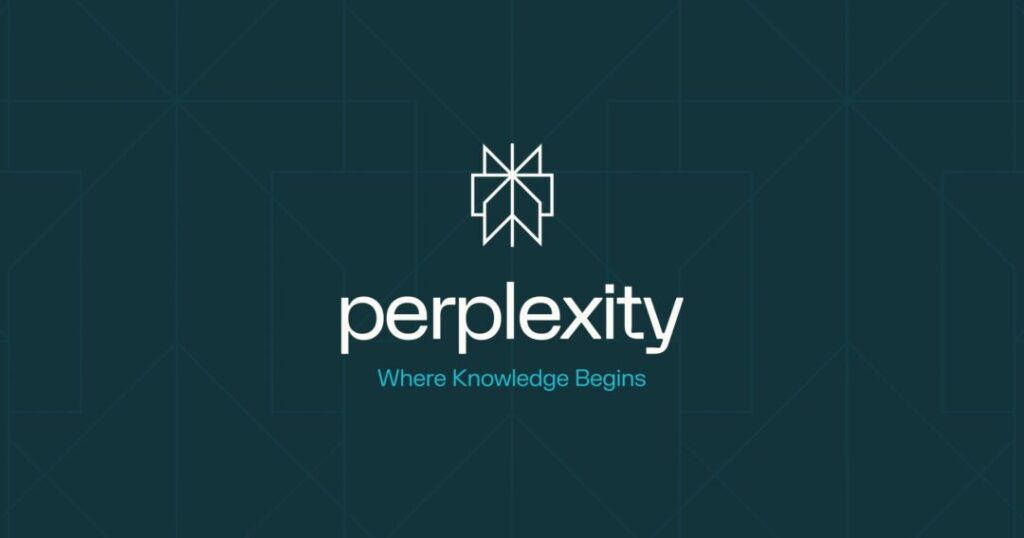
Perplexity AI is a groundbreaking AI Search Engine that has rapidly emerged as a top contender in 2024. Unlike traditional search engines which predominantly rely on keyword matching and link indexing, Perplexity takes a fundamentally different approach, prioritizing conversational interaction and comprehensive information delivery.
At the heart of Perplexity AI lies its advanced natural language processing (NLP) capabilities. This enables the search engine to understand the nuances of human language, going beyond simple keyword matches to grasp the context and intent behind user queries. As a result, Perplexity can deliver highly relevant and informative responses, often surpassing the need for users to sift through multiple web pages.
One of Perplexity AI’s standout features is its conversational interface. Instead of presenting a list of links, it engages users in a dynamic dialogue, allowing for follow-up questions, clarifications, and refinements of the initial query. This interactive experience makes the search process more intuitive and efficient, resembling a human conversation rather than a traditional search query. For instance, users can ask follow-up questions like “What are the side effects of this medication?” or “Can you compare different models of this product?” directly within the search results.
Furthermore, Perplexity AI emphasizes transparency and accountability. The search engine provides insights into the sources and reasoning behind its generated responses, empowering users to assess the credibility of the information presented. This level of transparency builds trust and fosters a deeper understanding of the search process. Additionally, Perplexity AI often cites its sources directly, allowing users to verify information and conduct further research if needed.
Another key strength of Perplexity AI is its ability to synthesize information from multiple sources. It can effectively combine data from various websites and databases to provide a comprehensive and informative overview of a topic. This capability is particularly valuable for complex subjects that require understanding from multiple perspectives. For example, a query about climate change might generate a response that incorporates scientific data, economic impacts, and policy implications.
While Perplexity AI is undoubtedly a powerful tool, it’s important to acknowledge that it’s still under development. Like any AI system, it may occasionally produce incorrect or misleading information. Users should always exercise critical thinking and verify information from multiple sources, especially for high-stakes decisions.
Despite its limitations, Perplexity AI represents a significant advancement in the realm of AI Search Engines. Its ability to understand context, engage in conversations, provide transparent results, and synthesize information has positioned it as a leading player in the industry. As the technology continues to evolve, Perplexity AI has the potential to redefine how we search for and consume information in the digital age.
2. Microsoft Bing

For years, Microsoft Bing lived in the shadow of Google, often dismissed as a secondary option. However, the landscape of search is changing dramatically, and Bing has emerged as a formidable contender, particularly in the realm of AI-powered search. Here’s why Bing deserves serious consideration as a top AI search engine in 2024:
1. Integration of Cutting-Edge AI: The OpenAI Advantage
Microsoft’s strategic partnership with OpenAI, the creators of ChatGPT and DALL-E, has been a game-changer. This collaboration has infused Bing with some of the most advanced AI capabilities available, transforming it into a truly intelligent search engine.
- Conversational Search and Natural Language Understanding: Bing excels at understanding complex queries phrased in natural language. It can interpret context, disambiguate meaning, and even engage in multi-turn conversations, providing a more intuitive and human-like search experience.
- AI-Powered Image and Video Search: Bing leverages AI to analyze and understand visual content, enabling users to search for images and videos with unprecedented accuracy. This includes searching by objects within images, identifying landmarks, and even finding visually similar content.
- Content Creation and Summarization: Bing can generate different creative text formats, like poems, code, scripts, musical pieces, email, letters, etc., and answer your questions in an informative way, even if they are open ended, challenging, or strange.
2. Focus on User Experience and Visual Appeal
Beyond its powerful AI capabilities, Bing prioritizes user experience with a clean interface and visually engaging results.
- Visually Rich Search Results: Bing goes beyond simple text-based results, incorporating images, videos, and interactive elements to provide a more engaging and informative search experience.
- Knowledge Graph Integration: Bing leverages its vast knowledge graph to provide direct answers to queries, summaries of topics, and related information, often eliminating the need to click through to other websites.
- Personalized Search Results: Bing learns from your search history and preferences to deliver more personalized results over time, tailoring the search experience to your individual needs.
3. Integration with the Microsoft Ecosystem
Bing benefits from its seamless integration with other Microsoft products and services, creating a unified and powerful ecosystem for work, productivity, and information access.
- Integration with Windows 11: Bing is deeply integrated into the Windows 11 operating system, providing easy access to search functionality directly from the taskbar.
- Synergy with Microsoft Edge: Bing is the default search engine for Microsoft Edge, and the two work together seamlessly to provide a smooth and efficient browsing experience.
- Connection to Microsoft 365: Bing integrates with Microsoft 365 applications like Word, PowerPoint, and Outlook, making it easy to find information, insert images, and complete tasks without leaving your workflow.
Challenges and Future Outlook:
Despite its impressive advancements, Bing still faces challenges in its quest to become the dominant AI search engine:
- Overcoming Google’s Dominance: Google remains the undisputed leader in search, with a massive user base and years of data accumulation. Bing needs to continue innovating and providing compelling reasons for users to switch.
- Addressing Ethical Concerns: As with any AI system, Bing must address concerns related to bias, misinformation, and the potential misuse of its capabilities. Transparency and responsible AI development will be crucial for maintaining user trust.
- Keeping Pace with Rapid Evolution: The field of AI is constantly evolving, and Bing needs to maintain its focus on research and development to stay ahead of the curve and deliver cutting-edge search experiences.
Microsoft Bing has transformed itself from a Google alternative into a powerful AI search engine in its own right. Its integration of advanced AI, focus on user experience, and connection to the Microsoft ecosystem make it a compelling choice for users seeking a more intelligent, intuitive, and visually engaging search experience in 2024 and beyond. As the battle for AI search dominance intensifies, Bing is well-positioned to challenge the status quo and redefine how we access and interact with information online.
3. Google AI Overviews
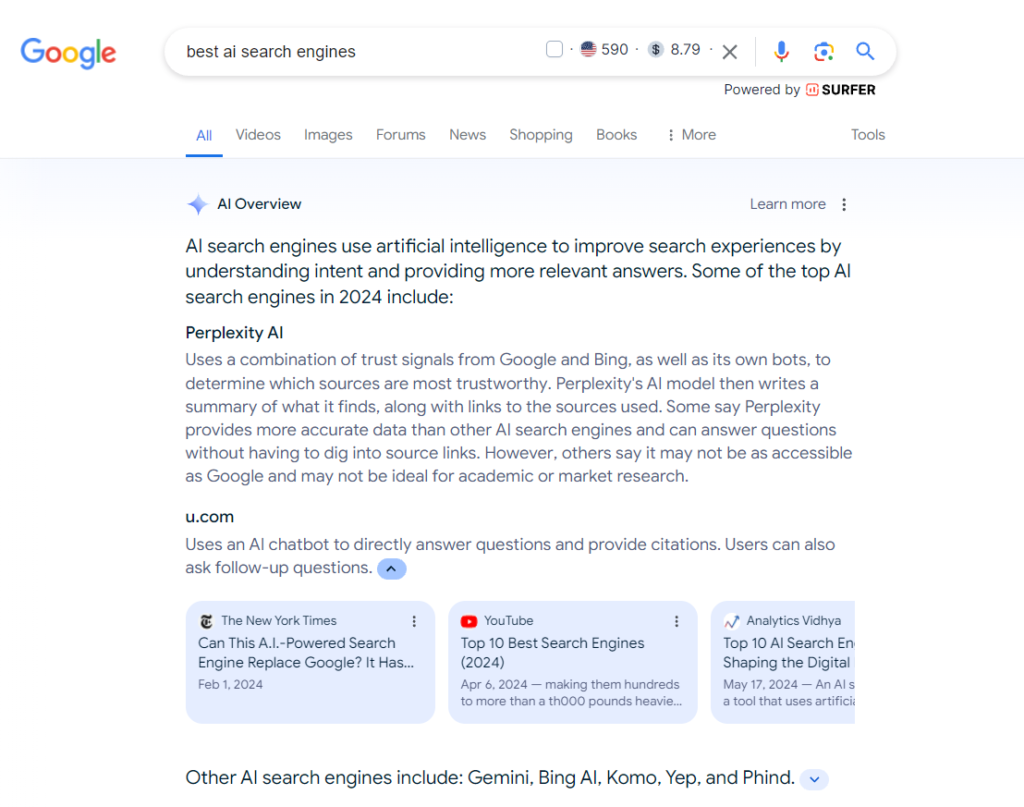
Google AI Overviews represent a groundbreaking advancement in the realm of AI search engines. This innovative feature, powered by Google’s sophisticated language models, aims to revolutionize how users interact with and consume information. By providing concise, informative, and comprehensive summaries of complex topics directly within search results, Google AI Overviews offer a fundamentally different approach to online search.
Unlike traditional search engines that primarily present a list of web pages, Google AI Overviews deliver synthesized information. By harnessing the power of AI, Google is able to process and condense information from multiple reliable sources into a coherent and easily understandable overview. This not only saves users time but also enhances their understanding of complex subjects by providing a clear and structured summary.
One of the key strengths of Google AI Overviews lies in its ability to comprehend and respond to complex queries. Leveraging advanced natural language processing (NLP) techniques, Google AI Overviews can accurately interpret the nuances of user input, going beyond simple keyword matching to deliver highly relevant and informative summaries. This capability empowers users to ask intricate questions and receive comprehensive answers without the need to sift through countless web pages.
Accuracy and reliability are paramount for Google AI Overviews. The system is designed to only present information that is backed by top-ranked web results, minimizing the risk of hallucinations or misinformation. This commitment to accuracy is crucial for building trust with users and establishing AI Overviews as a reliable source of information.
Furthermore, Google AI Overviews are constantly evolving and improving. By leveraging user feedback and advancements in AI technology, Google is continuously refining the system to enhance its accuracy, relevance, and overall user experience. This commitment to continuous improvement ensures that AI Overviews remain at the forefront of AI search technology.
While Google AI Overviews represent a significant step forward, it’s essential to acknowledge that they are still under development and have limitations. Challenges such as potential biases in training data and the occasional inaccuracies in generated summaries require ongoing attention and improvement. Additionally, the effectiveness of AI Overviews may vary depending on the complexity and specificity of the query.
Despite these challenges, Google AI Overviews have the potential to transform the way we search for and consume information. By providing concise, informative, and reliable summaries of complex topics, AI Overviews can empower users to make informed decisions, learn new things, and explore the world around them more efficiently. As AI technology continues to advance, Google AI Overviews are poised to become an indispensable tool for users seeking to understand complex topics and navigate the vast expanse of online information.
4. You.com
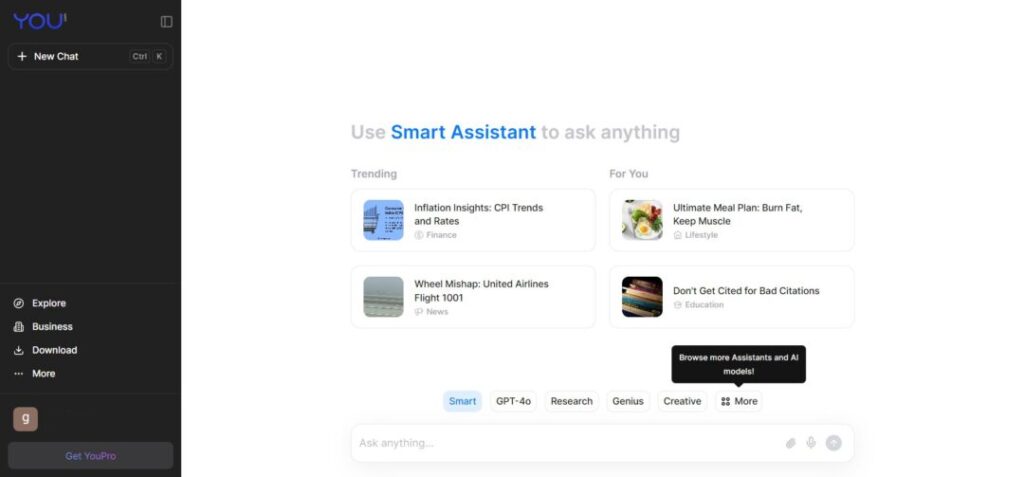
In the ever-evolving landscape of search engines, You.com has emerged as a strong contender for the title of “Top AI Search Engine” in 2024. But what exactly is You.com, and what sets it apart from the established giants like Google? Let’s delve deeper into this innovative platform.
From Personalized Search to AI Assistant:
You.com’s journey began in 2021 with a focus on personalization. It aimed to revolutionize search by understanding user intent and tailoring results accordingly. Gone were the days of sifting through endless links – You.com promised a more focused, time-saving experience.
However, You.com’s ambitions didn’t stop there. It quickly transitioned from a search engine to a full-fledged AI assistant. This shift introduced a chat-first interface, allowing users to interact with the platform in a conversational manner. This conversational approach is key to You.com’s appeal. Imagine asking a knowledgeable friend a question – You.com strives to replicate that natural, fluid interaction with information.
The Power of Large Language Models (LLMs):
The true magic behind You.com lies in its utilization of Large Language Models (LLMs). These complex AI models are trained on massive amounts of text data, enabling them to understand and respond to user queries in an informative, comprehensive way. You.com became the first search engine to integrate a consumer-facing LLM with real-time internet access in December 2022. This allows You.com to provide up-to-date responses with citations, enhancing both accuracy and transparency.
Beyond Simple Answers: AI Modes for Enhanced Exploration
You.com goes beyond just providing answers. It offers a suite of AI Modes designed to cater to different search intentions. Here’s a breakdown of these powerful modes:
- Smart Mode: This is the default mode, offering concise, informative answers ideal for everyday queries.
- Genius Mode: Need a deeper dive? Genius Mode delves into complex topics, providing a more comprehensive understanding for research or learning.
- Research Mode: Perfect for academic pursuits, Research Mode provides citations and references alongside its responses, ensuring verifiable information.
- Create Mode: Unleash your creativity with this mode. You.com can help you write different kinds of creative content, brainstorm ideas, and even generate different creative text formats.
Building Trust and Kindness into Search
You.com prioritizes user trust and aims to foster an online environment built on kindness. This commitment is reflected in several aspects:
- Focus on Privacy: You.com emphasizes data security, putting user privacy at the forefront.
- Verifiable Information: The LLM’s real-time internet access and focus on citations ensure users receive trustworthy, up-to-date information.
- Kindness-Oriented Features: You.com only displays private ads, promoting a less intrusive and more user-friendly experience.
The Future of AI Search
You.com is constantly evolving. With its focus on personalization, advanced AI capabilities, and user-centric values, You.com has carved a niche for itself in the competitive AI search engine landscape. As AI technology continues to develop, You.com is poised to play a significant role in shaping the future of how we interact with information online.
So, why is You.com considered a top AI Search Engine in 2024? Here’s a quick recap:
- Innovative AI Assistant: You.com goes beyond traditional search, offering a conversational interface and a variety of AI modes to cater to different search needs.
- Cutting-Edge LLMs: Real-time internet access and advanced language models enhance the accuracy and comprehensiveness of search results.
- Focus on User Trust: You.com prioritizes data privacy and verifiable information, building trust with its users.
- Kindness-Oriented Approach: By promoting a private ad experience, You.com creates a more positive and user-friendly online environment.
With its dedication to innovation and user experience, You.com is a force to be reckoned with in the world of AI search. Whether you’re seeking quick answers, in-depth research, or a creative spark, You.com provides a compelling alternative to the traditional search engine model.
5. Wolfram Alpha
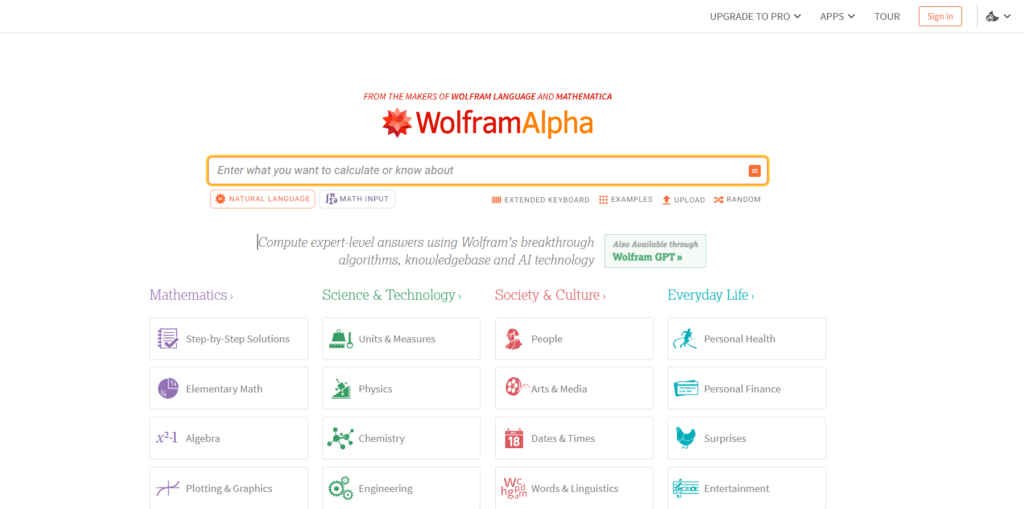
Wolfram Alpha is not your typical search engine. Instead of simply providing links to web pages, it aims to be a computational knowledge engine, delivering factual answers and expert-level calculations directly. This unique approach, powered by advanced algorithms, AI, and a vast knowledge base, has solidified its position as a top AI Search Engine in 2024.
Beyond Search, Computation:
Wolfram Alpha’s core strength lies in its ability to understand and process natural language queries, translating them into computations and delivering precise, data-driven results. Whether you’re seeking complex mathematical solutions, scientific data, or real-world information, Wolfram Alpha strives to provide definitive answers rather than vague search results.
A Vast Repository of Knowledge:
At the heart of Wolfram Alpha is a massive collection of curated data. This includes information from scientific publications, government data repositories, financial databases, and more. By integrating this diverse knowledge base with powerful algorithms, Wolfram Alpha can generate comprehensive reports, visualizations, and analyses on demand.
AI-Driven Insights:
While Wolfram Alpha has been around for some time, its AI capabilities have significantly enhanced its search prowess. Machine learning algorithms are employed to refine search results, identify patterns in data, and offer predictive insights. This AI-driven approach allows Wolfram Alpha to continuously improve its ability to understand and respond to user queries.
Real-World Applications:
Wolfram Alpha’s capabilities extend far beyond academic pursuits. It has found applications in various fields, including:
- Education: Students and educators can use it for complex calculations, data analysis, and problem-solving.
- Research: Scientists and researchers can leverage it to access and analyze vast datasets, accelerating their work.
- Business: Professionals can utilize Wolfram Alpha for financial modeling, market analysis, and data-driven decision making.
- Everyday Life: From unit conversions to recipe calculations, Wolfram Alpha can assist with a wide range of everyday tasks.
Challenges and Future Directions:
While Wolfram Alpha is undoubtedly a powerful tool, it’s not without its limitations. The system may struggle with highly subjective or ambiguous queries, and its reliance on structured data can sometimes hinder its ability to handle open-ended questions.
Despite these challenges, Wolfram Alpha’s potential is immense. As AI technology continues to advance, we can expect even more sophisticated computational capabilities and a broader range of applications. The integration of natural language processing and machine learning will further enhance Wolfram Alpha’s ability to understand and respond to user needs.
In Conclusion:
Wolfram Alpha’s unique approach to search, coupled with its advanced computational capabilities and vast knowledge base, has established it as a leading AI Search Engine in 2024. While it may not be a replacement for traditional search engines in all cases, it offers an invaluable resource for those seeking precise, data-driven answers to complex questions. As the technology continues to evolve, Wolfram Alpha is poised to play an increasingly important role in the future of information retrieval and analysis.
6. Komo

Komo is an AI-powered search engine that has rapidly gained traction in 2024. Unlike traditional search engines that primarily provide links to web pages, Komo aims to provide direct, comprehensive answers to user queries. By leveraging advanced AI techniques, Komo is redefining the search experience.
A Focus on Conversational Search
One of Komo’s standout features is its emphasis on conversational search. Instead of typing rigid keywords, users can interact with Komo in a natural language format, much like chatting with a knowledgeable friend. This conversational approach makes search more intuitive and efficient.
Leveraging AI for Enhanced Results
At the core of Komo’s capabilities is its sophisticated AI model. This model enables the search engine to understand complex queries, process information from various sources, and generate human-quality responses. Komo’s AI also plays a crucial role in:
- Summarization: Komo can condense lengthy articles or documents into concise summaries, saving users time.
- Question Answering: Komo excels at providing direct answers to questions, even when the information is scattered across multiple sources.
- Fact-Checking: Komo strives to deliver accurate and reliable information by cross-referencing data from multiple reputable sources.
Personalized Search Experience
Komo recognizes that every user has unique information needs. To address this, it employs AI algorithms to tailor search results based on user preferences, search history, and other relevant factors. This personalized approach ensures that users receive the most relevant and helpful information.
Beyond Search: Additional Features
Komo offers more than just search capabilities. Some of its additional features include:
- AI-Powered Writing Tools: Komo can assist with writing tasks such as drafting emails, creating social media posts, or generating creative content.
- Translation: Komo can translate text between different languages, making it a valuable tool for global users.
- Image Search: Komo’s image search functionality allows users to find relevant images based on visual or textual queries.
Challenges and Future Outlook
While Komo has made significant strides in AI search, it faces challenges common to the industry, such as ensuring the accuracy and reliability of information, addressing potential biases in AI models, and maintaining user privacy.
Despite these challenges, Komo’s potential is immense. As AI technology continues to evolve, Komo is well-positioned to become an even more powerful and indispensable tool for users seeking information and completing tasks. By staying at the forefront of AI research and development, Komo can solidify its position as a top AI Search Engine in the years to come.
In conclusion, Komo’s combination of conversational search, advanced AI capabilities, and a focus on user experience has contributed to its rise as a prominent AI Search Engine. As the search landscape continues to evolve, Komo’s ability to adapt and innovate will be crucial to its long-term success.
7. Phind
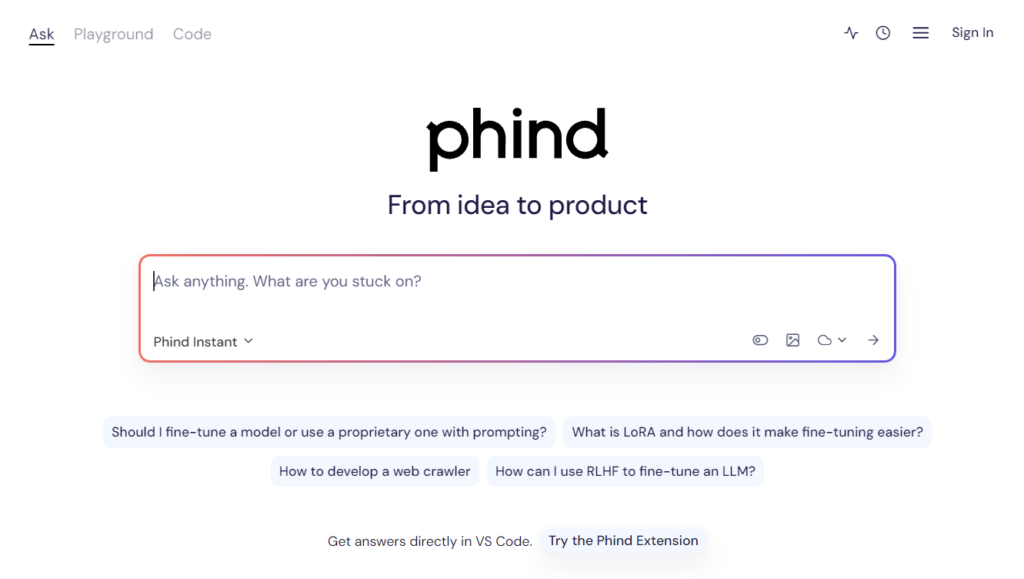
Phind has emerged as a prominent player in the AI search engine landscape, particularly captivating the developer community. Unlike traditional search engines or general-purpose AI assistants, Phind is meticulously designed to address the specific needs of programmers and engineers.
A Developer-Centric Approach
Phind’s core strength lies in its deep understanding of coding languages, frameworks, and development methodologies. It’s not just a search engine; it’s a powerful tool that assists developers in various aspects of their work:
- Code Generation: Phind can generate code snippets, functions, or even entire code blocks based on natural language prompts or specific requirements. This accelerates development and reduces manual coding efforts.
- Debugging and Troubleshooting: By analyzing error messages, code snippets, and relevant documentation, Phind can help identify and resolve coding issues, saving developers valuable time and frustration.
- Explaining Code Concepts: Phind excels at breaking down complex coding concepts into understandable terms, making it an invaluable resource for learning and understanding new technologies.
- API and Library Discovery: Developers can efficiently search for APIs and libraries, compare options, and find relevant documentation through Phind’s comprehensive database.
Leveraging AI for Enhanced Development
Phind’s AI capabilities are at the heart of its success. By employing advanced machine learning models, Phind can:
- Understand Code Context: Phind accurately interprets code structure, dependencies, and logic, providing relevant and contextually appropriate suggestions.
- Learn from Developer Feedback: Phind continuously improves its performance by analyzing user interactions and incorporating feedback to refine its algorithms.
- Provide Personalized Recommendations: Based on a developer’s coding history and preferences, Phind can offer tailored suggestions for libraries, tools, and best practices.
Beyond Code: A Comprehensive Developer Toolkit
While Phind primarily focuses on coding, it also offers additional features to enhance the developer experience:
- Documentation Search: Phind can efficiently search through extensive documentation, saving developers time and effort.
- Community Integration: Phind connects developers with online communities and forums, facilitating knowledge sharing and collaboration.
- Version Control Integration: Phind can integrate with popular version control systems, providing insights into code changes and history.
Challenges and Future Outlook
As with any AI-powered tool, Phind faces challenges such as ensuring code accuracy, preventing biases in generated code, and maintaining data privacy. However, the potential for Phind to revolutionize software development is immense.
As AI technology continues to advance, Phind is likely to expand its capabilities to include more sophisticated code analysis, automated testing, and even AI-driven code optimization. By staying at the forefront of AI research and development, Phind can solidify its position as an indispensable tool for developers worldwide.
In conclusion, Phind’s deep understanding of code, coupled with its powerful AI capabilities, makes it a standout AI Search Engine for developers. By streamlining coding tasks, providing valuable insights, and fostering a collaborative environment, Phind is transforming the way developers work.
Conclusion
The era of traditional search engines is rapidly evolving as AI-powered platforms redefine how we access and process information. The seven AI search engines explored in this article showcase the incredible potential of this technology to revolutionize our online experiences. From providing comprehensive answers to complex queries to offering specialized tools for various industries, these platforms are reshaping the way we search, learn, and work.
As AI continues to advance, we can anticipate even more sophisticated and tailored search experiences. The best AI search engines will be those that can effectively combine cutting-edge technology with a deep understanding of user needs and preferences. The future of search is undeniably bright, and the potential for AI to enhance our information-seeking capabilities is boundless.



